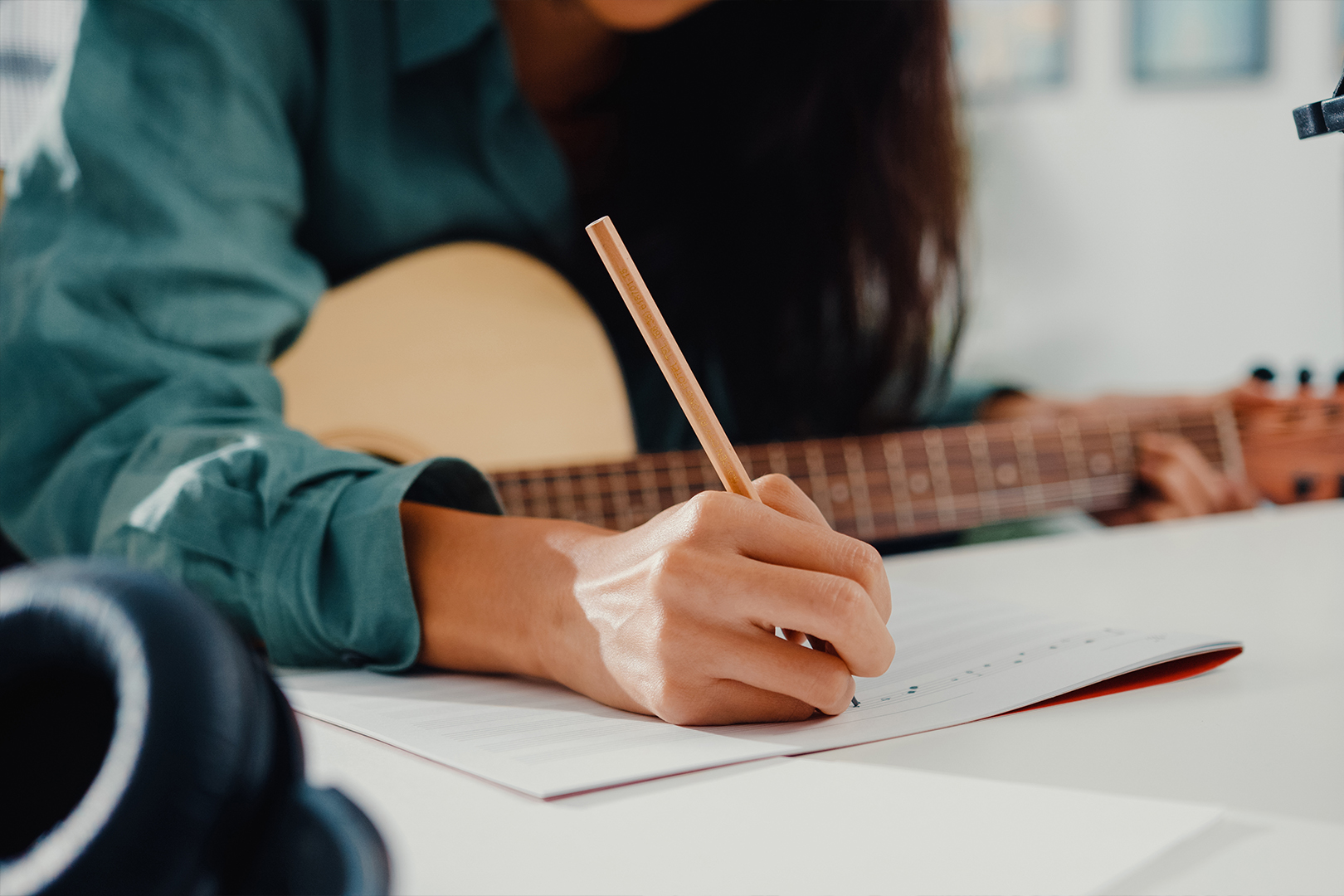- Writer’s block can be caused by a range of factors, from emotional challenges to external stressors and physical fatigue. Recognising the underlying cause of the block is the first step in finding a solution.
- Perfectionism, fear of failure or feeling “not good enough” can cause writers to avoid writing, or not able to allow a work to be “finished”. This can paralyse the creative process.
- Remember that sometimes it’s the “mistakes” that lead to the solution. Composers are often up against deadlines and working several jobs to make ends meet. This can lead to mental exhaustion which reduces creativity.
- Stress or ‘burnout’ can also be a block. Signs to look out for include lack of motivation, irritability, and a persistent sense of mental fog.
- External factors can also block writing. Being busy with family, distracted by social media.
Andrea Stolpe’s Top Tips for PRS For Music Include:
Learn to Trust Your Instincts
- Everyone has their own taste – find your own preferences and use them to create your own music.
Write Regularly
- Give yourself adequate time to find out how far you can develop your gift, don’t stop writing.
Write in Short Bursts
- You can generate ideas in 10 minutes by journaling or working up a simple chord progression. Listen to new music and choose a groove you’d like to use for your next song.
- Use your phone to make a quick recording about a song concept or sing a rough melody. These can be great ways to foster ideas and still maintain a healthy distance from them.
Repeat Yourself Until You Don’t
- You will always be influenced by the music of others and don’t let this put you off writing.
- Sometimes repeating a phrase in a different key with new underpinning chords creates a completely new composition.
Journal
- Just 5 minutes a day of journaling can increase productivity. Journaling with sensory language can help lyrics. Sensory language describes taste, touch, sight, sound, smell, and movement.
- Free writing where you simply write down everything that comes to mind helps to get your thoughts moving.
End With Something New
- Take the last 5-10 minutes to start something new.
- Journaling, sensory writing, or sifting through notes for good titles or musical ideas can bring motivation for the next day.
Change Your Process
- Try writing a few lyrics before picking up your instrument. If you’ve never used a rhythm track or drum loop, allow groove to be your leading element.
Don’t Write Full Songs
- At some point we need to finish tunes but focusing on small, measurable activities and then stepping away from our song enables us to listen more objectively and decide what does and doesn’t work.
- Listen whilst walking to the bus stop or doing the housework to give some distance
More Suggestions from the Writers Referenced Below:
Creative constraints
- Sometimes setting boundaries can help our creativity. By limiting yourself to, for example, only three chords or a specific theme, you create a framework within which boundaries it’s easier for you to be creative.
- If you have too many possibilities, it can be overwhelming – a constraint can help you find focus.
Collaboration with other artists
- A collaboration with other musicians can provide you with new perspectives and ideas that you might not have come up with on your own. Everyone brings their own influences and experiences, which can give you the impulse you need.
New artistic input from outside
- If you feel stuck in a creative dead end, it can help to let yourself be inspired by other art forms.
- Read a book, watch a movie, go to a museum, or listen to music that’s completely different from what you usually make.
New sounds and instruments
- Experiment with sounds and instruments that you don’t normally use. Try new effects or plugins, unusual chord progressions, or an instrument you’ve never used in your songs before. The unusual sound often creates new melodies and ideas.
Word games and association techniques
- If you’re lacking words, try association techniques. Write down a word that comes to mind and then write down everything you associate with it.
- Using synonyms or rhyming dictionaries can also help you get the writing process going.
Taking breaks
- Creativity is like a muscle – it needs care and recovery. Make sure to take regular breaks where you simply do nothing, but just let yourself be inspired by things.
- Whether it’s a book, a movie, or attending a concert – these “recharging phases” are just as important as active songwriting. Most of the time, the impulse for something new comes on its own.
Creative card trick
- Use Brian Eno’s “Oblique Strategies”. This is a collection of cards with cryptic statements and instructions written on them, such as “Try it backwards” or “Change the rhythm”.
- These instructions or thought-provoking impulses are meant to help you break thought patterns and find new ideas. When you’re stuck, simply draw a card and follow the instruction without thinking too much about it.
- These unconventional approaches can often be exactly the spark you need to move forward. Of course, you can also compile such instructions yourself and come up with your own thought-provoking impulses.
Flow state
- Flow state is where you are so concentrated on the task that you lose track of time and this can be the most creative space.
- To get into a “flow state” you have to believe your work is essential and that your abilities are adequate for the task and that you can control the inspiration and commitment, manage the resources and that you will successfully complete the task.
- You can create flow friendly conditions during your writing session.
- Although individual differences and psychological traits can help or impede flow exist, your intrinsic motivation, confidence, and focus on the task at hand can all be important factors in triggering flow.


